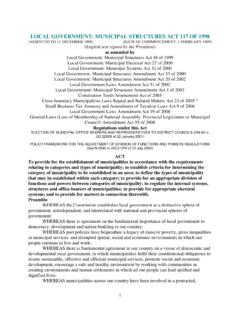Transcription of SECTION 118 OF THE MUNICIPAL SYSTEMS ACT 32 OF 2000 …
1 Updated May 2015 1 SECTION 118 OF THE MUNICIPAL SYSTEMS ACT 32 OF 2000 CITY OF TSHWANE metropolitan municipality v MATHABATHE & ANOTHER (502/12) [2013] ZASCA 60 (22 May 2013) INTRODUCTION In order to transfer ownership of any immovable property in the deeds registry it is necessary to obtain a rates clearance certificate (RCC) from the local authority. The RCC needs to be valid for a period of 60 days from date of issue. The local authority thus issues clearance figures which include the current arrears on the property plus an advance calculation of rates, sewer, electricity and water charges. The advance calculation is generally for a period of 4 months in advance which allows the seller 60 days to pay the figures and the clearance certificate to be valid for a further 60 days from issue.
2 The above procedure and requirements are in terms of SECTION 118 of the MUNICIPAL SYSTEMS Act 32 of 2000. From a conveyancing point of view the importance of RCC s are that they serve the purpose of ensuring that all rates and charges due on the property transferred are paid by the seller and the purchaser receives transfer of the property free of MUNICIPAL debt. SECTION 118(1) vs SECTION 118(3) SECTION 118(1) provides that the seller may obtain a RCC in respect of MUNICIPAL debt on the property limited to a historical period of 2 years preceding the application for the clearance figures. This means that the RCC may not necessarily include the full debt due to the local authority as the RCC is limited to the 2 year period. SECTION 118(3) provides that MUNICIPAL debt is a charge upon the property and that this charge enjoys preference over any mortgage bond registered against the property.
3 This legislation has now been the subject of a case before the Supreme Court of Appeal. CITY OF TSHWANE metropolitan municipality v THOMAS AND NEDBANK LIMITED The SCA confirmed that the local authority is obliged to issue a RCC where MUNICIPAL debts for a period of two years preceding the application are paid and the local authority may not withhold the RCC on the basis that there remains, after the issue of a clearance certificate outstanding debts beyond the two year period. The SCA held that SECTION 118(3) is not an embargo provision, it is a security provision and that the security provided by SECTION 118(3) amounts to a lien having the effect of a statutory hypothec over property. In other words the SECTION does not allow the local authority to withhold the RCC where payment is made in terms of SECTION 118(1) but gives the local authority security for the payment of the amount due beyond the two year period.
4 The court held further that upon registration of transfer, the local authority does not lose it rights under SECTION 118(3). The importance of this case is the common interpretation is that the local authority has a lien over the property for the seller s historical debt that may be exercised over the property even though the purchaser has taken transfer, in effect making the purchaser liable for the debt. The constitutionality of this provision is questionable and in our opinion it is unlikely that a local authority would succeed in such an action. The case has been referred to the constitutional court and the outcome is awaited. CONCLUSION Inasmuch as the local authority is of the view that they can pursue a purchaser after transfer for historical charges on the above basis, it has been suggested in order to protect the purchaser, agreements for the sale of immovable property include a clause that the seller be obliged to pay the full historical debt to the local authority.
5 As indicated above, whether the local authority will be successful is questionable, however the purchaser does require protection from the threat of such action and the resultant legal costs of defending the legal action.








